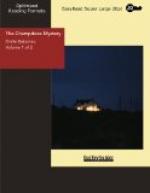“Ah! it is to the banker’s they have gone!”
He questioned a man coming downstairs and heard that M. Martin Rigal, the banker, had his offices and residence there.
“I have struck a vein of good luck to-day,” thought he; “and now if my little friend the chestnut seller can only tell me the names of these men, I have done a good day’s work. I do hope that he has not gone.”
The boy was still there, and he had two customers standing by the chafing-dish which contained the glowing charcoal, and a working lad in cap and blouse was arguing so hotly with the lad that they did not notice Andre’s appearance.
“You can stow that chat,” said the boy; “I have told your father the price I would take. You want my station and stock-in-trade. Hand over two hundred and fifty francs, and they are yours.”
“But my dad will only give two hundred,” returned the other.
“Then he don’t need give nothing, for he won’t get ’em,” answered the chestnut vender sharply. “Two hundred francs for a pitch like this! Why, I have sometimes taken ten francs and more, and that ain’t a lie, on the word of Toto Chupin.”
Andre was tickled with this strange designation, and addressed himself to the lad who bore it.
“My good boy,” said he, “I think you were here an hour ago. Did you see anything of three gentlemen who came out of the house and stood talking together for a short time?”
The lad turned sharply round and examined his questioner from tip to toe with an air of the most supreme impertinence; and then, in a tone which matched his look, replied,—




